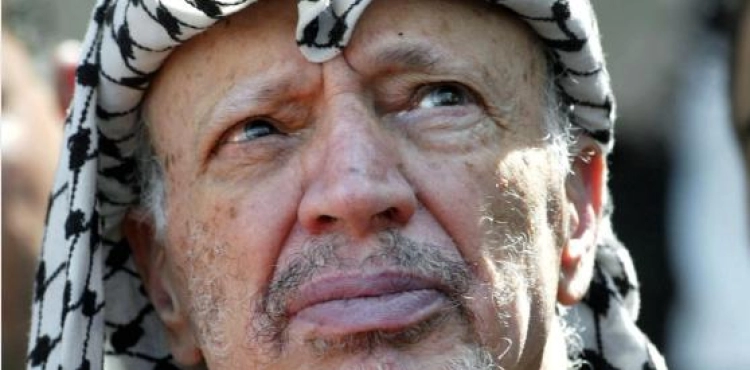The 15th anniversary of the death of Yasser Arafat, Abu Ammar, was killed on November 11, 2004.
The late President "Abu Ammar" was born in Jerusalem on the fourth of August 1929, and his full name "Mohammed Yasser" Abdul Raouf Daoud Suleiman Arafat Al-Kidwa Husseini.
Yasser Arafat was educated in Cairo and participated as a reserve officer in the Egyptian army in confronting the tripartite aggression against Egypt in 1956.
Arafat studied at the Faculty of Engineering at Fouad I University in Cairo.
He also participated with a group of Palestinian nationalists in the founding of the Palestinian National Liberation Movement "Fatah" in the fifties, and became an official spokesman in 1968, and was elected Chairman of the Executive Committee of the Palestine Liberation Organization in February 1969, after he held the position before that Ahmed Shukairy and Yahya Hamouda.
In 1974, Abu Ammar delivered a speech on behalf of the Palestinian people to the United Nations General Assembly in New York. "I came with a rebel gun with one hand and an olive branch with the other. Don´t drop the green branch from my hand," he said.
As General Commander of the Joint Command of the Palestinian Revolutionary Forces and the Lebanese National Movement, during the summer of 1982, Abu Ammar led the battle against the Israeli aggression against Lebanon. He also led the battles of steadfastness during the 88-day siege imposed by the Israeli forces around Beirut, which ended with an international agreement to exit the Palestinian fighters. From the city, when journalists asked Yasser Arafat the moment he left by sea to Tunisia on a Greek ship about his next stop, he replied, "I´m going to Palestine."
Leader Yasser Arafat, the leadership and the PLO cadre were guests of Tunisia, and from there he began completing his determined steps towards Palestine.
On October 1, 1985, Yasser Arafat narrowly escaped an Israeli raid on the Tunisian suburb of Hammam-Shat, which led to the deaths of dozens of Palestinian and Tunisian martyrs and wounded. In a unifying session of the Palestinian National Council, Arafat began to lead wars on several fronts. Yeh Palestinians and justice aspirations.
Following the Declaration of Independence in Algeria on November 15, 1988, the late 13 and 14 December of the same year in the United Nations General Assembly launched the Palestinian peace initiative to achieve a just peace in the Middle East, where the General Assembly then moved to Geneva because of the refusal The United States granted him a visa to New York, and established the initiative for the decision of the US administration headed by Ronald Reagan on the 16th of the same month, to begin a dialogue with the Palestine Liberation Organization in Tunisia as of March 30, 1989.
In 1993, Yasser Arafat and former Israeli Prime Minister Yitzhak Rabin signed the Oslo Declaration of Principles between the PLO and the Israeli government at the White House on September 13, under which Yasser Arafat returned as PLO staff to Palestine.
On January 20, 1996, Yasser Arafat was elected president of the Palestinian National Authority (PNA) in a general election.
After the failure of the Camp David negotiations in 2000 as a result of Israeli intransigence and Yasser Arafat´s keenness not to compromise Palestinian rights, the Al-Aqsa Intifada broke out on September 28, 2000. Israeli forces and tanks besieged President Arafat at his headquarters under the pretext of accusing him of leading the intifada. It called it the "protective wall", and kept the siege applied to it in a narrow space that lacks the minimum conditions of human life.
The martyr Yasser Arafat was absent from his body from Palestine, but his struggle legacy is still firmly established among our people and leadership.












